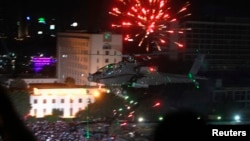PENTAGON —
The United States is defending its decision to allow some military aid to flow to Egypt, despite concerns that the country's promised transition back to democracy has been anything but smooth.
Egyptian police in Alexandria respond to protesting students Wednesday with tear gas and buckshot.
Clashes like this one have some questioning why the United States is agreeing to send 10 Apache attack helicopters to Egypt.
Pentagon spokesman Colonel Steve Warren said, “We’ve identified a very significant mutual national security interest. It is in our interest; it is in America’s national security interest for Egypt to continue battling terrorism in the Sinai.”
David Schenker, director of the Program on Arab Politics at the Washington Institute, said the terror threat is a growing concern.
“The insurgency in the Sinai is booming. This is ungoverned space. The Bedouin and the residents of the Sinai have long been underserved by the government of Egypt.”
Schenker said the Apache is Egypt’s weapon of choice in fighting the growing numbers of al-Qaida-linked militants in the Sinai, but that Egypt may have found a way to help force Washington’s hand.
“They also have some Russian helicopters, and the notion that they’re going to go out and procure more Russian helicopters with Saudi money - something that they’ve said and that is said is currently being negotiated - also prompted the transfer right now,” he said.
Analysts say the move also could help ease tensions between Washington and Cairo, even as the U.S. pushes Egypt to follow through on the promise of free and fair elections.
As for assurances Egypt will not use the helicopters against civilians, the Pentagon’s Colonel Warren had this to say: “Well, we continue to dialogue with them [the Egyptians] and to ensure that they do obey.”
Warren noted the U.S. has turned down Egyptian requests to move ahead with transfers of F-16 fighter jets, M-1 tanks and harpoon missiles, which he said are not needed in the fight against terrorists.
Egyptian police in Alexandria respond to protesting students Wednesday with tear gas and buckshot.
Clashes like this one have some questioning why the United States is agreeing to send 10 Apache attack helicopters to Egypt.
Pentagon spokesman Colonel Steve Warren said, “We’ve identified a very significant mutual national security interest. It is in our interest; it is in America’s national security interest for Egypt to continue battling terrorism in the Sinai.”
David Schenker, director of the Program on Arab Politics at the Washington Institute, said the terror threat is a growing concern.
“The insurgency in the Sinai is booming. This is ungoverned space. The Bedouin and the residents of the Sinai have long been underserved by the government of Egypt.”
Schenker said the Apache is Egypt’s weapon of choice in fighting the growing numbers of al-Qaida-linked militants in the Sinai, but that Egypt may have found a way to help force Washington’s hand.
“They also have some Russian helicopters, and the notion that they’re going to go out and procure more Russian helicopters with Saudi money - something that they’ve said and that is said is currently being negotiated - also prompted the transfer right now,” he said.
Analysts say the move also could help ease tensions between Washington and Cairo, even as the U.S. pushes Egypt to follow through on the promise of free and fair elections.
As for assurances Egypt will not use the helicopters against civilians, the Pentagon’s Colonel Warren had this to say: “Well, we continue to dialogue with them [the Egyptians] and to ensure that they do obey.”
Warren noted the U.S. has turned down Egyptian requests to move ahead with transfers of F-16 fighter jets, M-1 tanks and harpoon missiles, which he said are not needed in the fight against terrorists.




